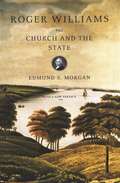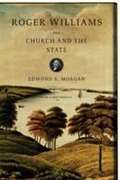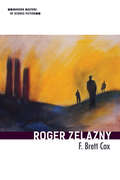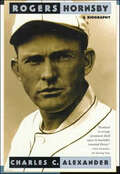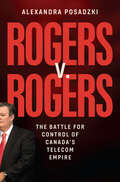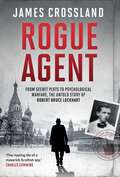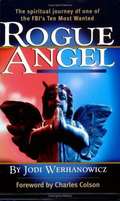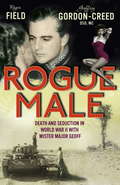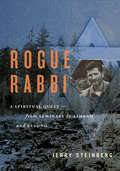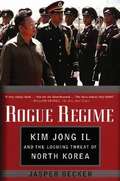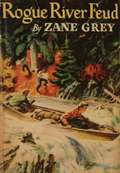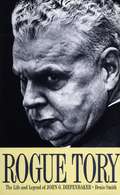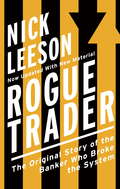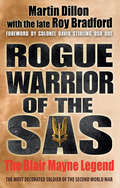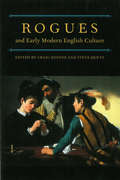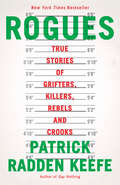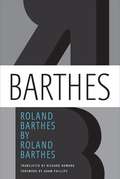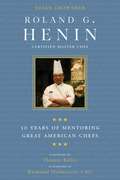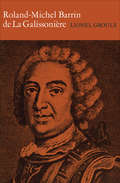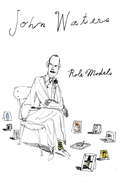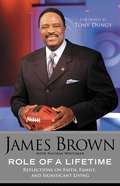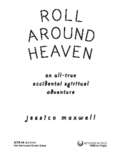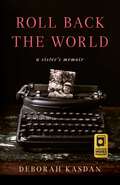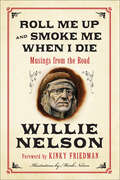- Table View
- List View
Roger Williams: The Church and the State
by Edmund S. MorganAn illuminating portrait of the nation's earliest--and most passionate--advocate for the total separation of church and state. A classic of its kind, Edmund S. Morgan's Roger Williams skillfully depicts the intellectual life of the man who, after his expulsion in 1635 from the Massachusetts Bay Colony, founded what would become Rhode Island. As Morgan re-creates the evolution of Williams's thoughts on the nature of the church and the state, he captures with characteristic economy and precision the institutions that informed Williams's worldview, from the Protestant church in England to the Massachusetts government in the seventeenth century. In doing so, Morgan reveals the origins of a perennial--and heated--American debate, told through the ideas of one of the most brilliant polemicists on the subject, a man whose mind, as Morgan describes, "drove him to examine accepted ideas and carry them to unacceptable conclusions." Forty years after its first publication, Roger Williams remains essential reading for anyone interested in the church, the state, and the right relation of the two.
Roger Williams: The Church and the State
by Edmund Sears MorganDid the founding fathers of the United States believe in separation of church and state? Of course. Did they not secure an amendment to their Constitution, stating that "Congress shall make no law respecting an establishment of religion, or prohibiting the free exercise thereof"? Thomas Jefferson declared in 1802 that these words placed "a wall of eternal separation between church and state." It is nevertheless fair to ask how high Jefferson and the other founding fathers believed that wall to rise.
Roger Zelazny (Modern Masters of Science Fiction #1)
by F. Brett CoxChallenging convention with the SF nonconformist Roger Zelazny combined poetic prose with fearless literary ambition to become one of the most influential science fiction writers of the 1960s. Yet many critics found his later novels underachieving and his turn to fantasy a disappointment. F. Brett Cox surveys the landscape of Zelazny's creative life and contradictions. Launched by the classic 1963 short story "A Rose for Ecclesiastes," Zelazny soon won the Hugo Award for Best Novel with …And Call Me Conrad and two years later won again for Lord of Light. Cox looks at the author's overnight success and follows Zelazny into a period of continued formal experimentation, the commercial triumph of the Amber sword and sorcery novels, and renewed acclaim for Hugo-winning novellas such as "Home Is the Hangman" and "24 Views of Mt. Fuji, by Hokusai." Throughout, Cox analyzes aspects of Zelazny's art, from his preference for poetically alienated protagonists to the ways his plots reflected his determined individualism. Clear-eyed and detailed, Roger Zelazny provides an up-to-date reconsideration of an often-misunderstood SF maverick.
Rogers Hornsby: A Biography
by Charles C. AlexanderA relentless competitor, Rogers Hornsby--arguably the finest right-handed hitter in baseball's history--was supremely successful on the baseball field but, in many ways, a failure off it. In this biography, Charles Alexander turns his skilled eye to this complex individual, weaving the stories of his personal and professional life with a lively history of the sport.
Rogers v. Rogers: The Battle for Control of Canada's Telecom Empire
by Alexandra PosadzkiA riveting, deeply reported account that takes us inside the dramatic battle for control of Canada&’s largest wireless carrier, and paints a broader picture of the cutthroat telecom industry, the labyrinth of regulatory and political systems that govern it, and the high-stakes corporate games played by the Canadian establishment. Alexandra Posadzki&’s ground-breaking coverage in the Globe and Mail exposed one of the most spectacular boardroom and family dramas in Canadian corporate history—one that has pitted the company&’s extraordinarily powerful chairman and controlling shareholder, Edward Rogers, against not only his own management team but also the wishes of his mother and two of his sisters. Hanging in the balance is no less than the pending $20 billion acquisition of Shaw Communications, a historic deal that promises to transform Rogers into the truly national telecom empire that its late founder, Ted Rogers, always envisioned. Based on deeply sourced, investigative reporting of the iconic $30 billion publicly traded telecom and media giant, Posadzki takes us inside a company that touches the lives of millions of Canadians, challenging what we thought we knew about corporate governance and who really holds the power. Rogers v. Rogers is also a story of family legacy and succession, of an old guard pushing back at the new guard, and of a company struggling to find its footing in the wake of its legendary founder&’s death. At the heart of it all is a dispute between warring factions of the family over how they each interpret the desires of the late patriarch and the very identity of the company that bears their name.
Rogue Agent: From Secret Plots to Psychological Warfare: The Untold Story of Robert Bruce Lockhart
by James CrosslandTaking the reader on a colorful journey from the Russian Revolution through both world wars, this is the story of "the riveting life of maverick spy&” Robert Bruce Lockhart.Diplomat, conspirator, intelligence gatherer, propagandist, and charmer, Rogue Agent tells the colorful story of London&’s key agent in Moscow during the first half of the twentieth century, Sir Robert Bruce Lockhart. Sir Robert Bruce Lockhart (1887–1970) was an impressive figure who played a vital role in both world wars. He was a man who charmed his way into the confidences of everyone from Leon Trotsky to Anthony Eden. A man whom the influential press baron Lord Beaverbrook claimed, "could well have been prime minister.&” And yet Lockhart died almost forgotten and near destitute, a Scottish footnote in the pages of history. Rogue Agent is the first biography of this gifted yet habitually flawed maverick. It chronicles his many exploits, from his time as Britain&’s agent in Moscow and his role in a plot to bring down the communist regime to his leadership in the Political Warfare Executive—a secret body responsible for disinformation and propaganda during World War II. Exploring Lockhart&’s unorthodox thinking and contributions to the development of psychological warfare, as well as his hedonistic lifestyle, late nights, and many affairs that left him in a state of perpetual debt and emotional turmoil, Rogue Agent presents the thrilling and dramatic tale of this unconventional war hero.
Rogue Angel: The Spiritual Journey of One of the FBI's Ten Most Wanted
by Jodi WerhanowiczMary Kay had a difficult childhood, a bad marriage, when she met Paul and so began her life of crime. Only after imprisonment does she discover Christ. From that time on, her life changes. Eventually she is free and spends the rest of her life working in many facets of prison ministry and rehabilitation work. The book really makes for a good reflection.
Rogue Male: Sabotage and seduction behind German lines with Geoffrey Gordon-Creed, DSO, MC
by Roger Field And Geoffrey Gordo N CreedThis is the untold story of one of the most lethal and successful soldiers of the Second World War - a highly decorated hero as well as a self-confessed rogue. In the tank war in the desert of North Africa, Mister Major Geoff, as he came to be known, quickly showed himself a soldier of superb athleticism, unwavering will to win and almost superhuman instincts when it came to survival and outwitting the enemy. Almost incredibly he won the Military Cross on his very first day in action. He fought alongside the SAS in its early days and was with them while they were forging the ruthless fighting techniques that have made them feared throughout the world. He played a decisive role in the Greek resistance to German occupation, and was praised by Churchill when he held up two German divisions more or less single-handedly. While in Greece he also became involved in some of the dirtiest hand to hand fighting of the war. To the men with whom he fought shoulder to shoulder he was 'Saint Geoff', to his enemies he was the devil incarnate, a man who would stop at absolutely nothing, and to his critics among the partisans he a was a womanizer, more interested in enjoying himself than killing the enemy. This is an honest account of winning the war not by fair play but by being more ruthless than your enemy. But maybe what is even more extraordinary than his soldiering - its predatory ruthlessness and amorality - is the frank account of sexual adventuring that went with it. This is how the dogs of war behave when they are let off the leash.
Rogue Rabbi: A Spiritual Quest—From Seminary to Ashram and Beyond
by Jerry SteinbergThis memoir of an adventurous quest for inner peace is complete with explorations of the rational and the mystical, and the many ways of faith. Revealing an understanding of God that goes beyond the conventional, Rogue Rabbi tells the story of a seeker. After traveling to India and investigating the Christian faith, Jerry Steinberg went to medical school and narrowed his focus to psychotherapy—working with past-life regression, dreams, and psychogenic illness. He also became a rabbi—but never ceases to explore all aspects of faith, taking up a specialization in Kabbalah, a discipline of Jewish mysticism. As the author seeks the essence of spirituality through the interface between rationalism and mysticism, and between religion and sexuality, the story of this real-life spiritual explorer both inspires and instructs on the paths to peace and acceptance.
Rogue Regime: Kim Jong Il and the Looming Threat of North Korea
by Jasper BeckerWhat happens when a dictator wins absolute power and isolates a nation from the outside world? North Korea, ruled by Kim Jong Il, seems destined to survive and linger on for some time, a menace to its own people and to the rest of the world.
Rogue River Feud: A Western Story
by Zane GreyAlong the notorious Rogue River, gold seekers, crazed by the discovery of nuggets that made them rich overnight, are at war with one another. The river itself swarms with salmon, bringing along with them another kind of wealth and violent fighting between fishermen and the fish-packing monopoly. Into this scene comes Keven Bell, returning to face life after being handicapped by a disfiguring wound he received in World War I. Keven teams up with a broken-down fisherman and boatbuilder. When they try to buck the salmon-packing monopoly, they encounter violence and trickery; their boat is sunk and they are left to swim for their lives.Keven is tended to by Beryl, the daughter of a gold miner. His convalescence is slow, but the autumn days, fishing and camping, make a woodland dream of romance. But no sooner has an operation straightened out Keven's injuries than he is framed on a charge of murder in the salmon-packing war. Keven must carry on as best he can, along with what help Beryl and her old father can give, to clear his name and ensure his and Beryl's safety on the turbulent Rogue.Zane Grey's vigorous storytelling and portrayal of violence in the wild make this novel one of his best. There is a deep emotional feeling for nature in the raw, for the great salmon runs, and for the clashes of men fighting for gold.
Rogue Tory: The Life and Legend of John G. Diefenbaker
by Denis SmithWinner of the Dafoe Book Prize Winner of the University of British Columbia Medal for Canadian Biography 1995 marked the 100th anniversary of that most charismatic and enigmatic public figure, the thirteenth prime minister of Canada, John George Diefenbaker. Beloved and reviled with equal passion, he was a politician possessed of a flamboyant, self-fabulizing nature that is the essential ingredient of spellbinding biography. After several runs at political office, Diefenbaker finally reached the Commons in 1940; sixteen years later he was leader of the Progressive Conservative Party. In 1958, after a campaign that dazzled the voters, the Tories won the largest majority in the nation’s history: the Liberal party was shattered, its leader, Lester Pearson, humiliated by an electorate that had chosen to “follow John. ” Diefenbaker’s victory promised a long and sunny Conservative era. It was not to be: instead Dief gave the country a decade of continuous convulsion, marked by his government’s defeat in 1963 and his own forced departure from the leadership in 1967, a very public drama that divided his party and riveted the nation. When Diefenbaker died in 1979, he was given a state funeral modeled - at his own direction - on those of Churchill and Kennedy. It culminated in a transcontinental train journey and burial on the bluffs overlooking Saskatoon, alongside the archive that houses his papers - the only presidential-style library built for a Canadian prime minister. Canadians embraced the image of Dief as a morally triumphant underdog, even as they were repelled by his outrageous excesses. He revived a moribund party and gave the country a fresh sense of purpose but he was no match for the dilemmas of the Cold War of Quebec nationalism, or the subtleties of the country’s relations with the United States. This compelling biography, illuminating both legend and man and the nation he helped shape, was among the most highly praised books of the year. From the Hardcover edition.
Rogue Trader
by Nick LeesonWhen Leeson was arrested in 1995 for bringing Barings Bank to its knees, it initially seemed as if he had single-handedly crushed the company. Indeed, it was he alone who found himself in the dark confines of a Singapore jail, from where he wrote Rogue Trader. Now updated for the twentieth anniversary of the collapse of Barings, this is his story of a broken system; of a cast of characters blind to anything but profits - whatever the cost. Leeson's tale of boom and bust is an important reminder of the immense power the banking system held and, worryingly, still holds.
Rogue Trader
by Nick LeesonWhen Leeson was arrested in 1995 for bringing Barings Bank to its knees, it initially seemed as if he had single-handedly crushed the company. Indeed, it was he alone who found himself in the dark confines of a Singapore jail, from where he wrote Rogue Trader. Now updated for the twentieth anniversary of the collapse of Barings, this is his story of a broken system; of a cast of characters blind to anything but profits - whatever the cost. Leeson's tale of boom and bust is an important reminder of the immense power the banking system held and, worryingly, still holds.
Rogue Warrior of the SAS: The Blair Mayne Legend
by Martin Dillon Roy BradfordMore than half a century after his death, Lt Col. Robert Blair Mayne is still regarded as one of the greatest soldiers in the history of military special operations. He was the most decorated British soldier of the Second World War, receiving four DSOs, the Croix de Guerre and the Légion d'honneur, and he pioneered tactics used today by the SAS and other special operations units worldwide. Rogue Warrior of the SAS tells the remarkable life story of 'Colonel Paddy', whose exceptional physical strength and uniquely swift reflexes made him a fearsome opponent. But his unorthodox rules of war and his resentment of authority would deny him the ultimate accolade of the Victoria Cross. Drawing on personal letters and family papers, declassified SAS files and records, together with the Official SAS Diary compiled in wartime and eyewitness accounts from many who served with him, the picture emerges of a soldier who, although a flawed hero, was unquestionably one of the most distinctive combatants of the campaigns in the Western Desert and Europe.
Rogues and Early Modern English Culture
by Craig Dionne Steve MentzRogues and Early Modern English Culture is a definitive collection of critical essays on the literary and cultural impact of the early modern rogue. Under various names-rogues, vagrants, molls, doxies, vagabonds, cony-catchers, masterless men, caterpillars of the commonwealth-this group of marginal figures, poor men and women with no clear social place or identity, exploded onto the scene in sixteenth-century English history and culture. Early modern representations of the rogue or moll in pamphlets, plays, poems, ballads, historical records, and the infamous Tudor Poor Laws treated these characters as harbingers of emerging social, economic, and cultural changes. Images of the early modern rogue reflected historical developments but also created cultural icons for mobility, change, and social adaptation. The underclass rogue in many ways inverts the familiar image of the self-fashioned gentleman, traditionally seen as the literary focus and exemplar of the age, but the two characters have more in common than courtiers or humanists would have admitted. Both relied on linguistic prowess and social dexterity to manage their careers, whether exploiting the politics of privilege at court or surviving by their wits on urban streets.
Rogues: True Stories of Grifters, Killers, Rebels and Crooks
by Patrick Radden KeefeNEW YORK TIMES BESTSELLER • From the award-winning author of Empire of Pain and Say Nothing—and one of the most decorated journalists of our time—twelve enthralling true stories of skulduggery and intrigue"An excellent collection of Keefe's detective work, and a fine introduction to his illuminating writing." —NPR &“Fast-paced...Keefe is a virtuoso storyteller." —The Washington PostPatrick Radden Keefe has garnered prizes ranging from the National Magazine Award to the Orwell Prize to the National Book Critics Circle Award for his meticulously-reported, hypnotically-engaging work on the many ways people behave badly. Rogues brings together a dozen of his most celebrated articles from The New Yorker. As Keefe says in his preface &“They reflect on some of my abiding preoccupations: crime and corruption, secrets and lies, the permeable membrane separating licit and illicit worlds, the bonds of family, the power of denial.&”Keefe brilliantly explores the intricacies of forging $150,000 vintage wines, examines whether a whistleblower who dared to expose money laundering at a Swiss bank is a hero or a fabulist, spends time in Vietnam with Anthony Bourdain, chronicles the quest to bring down a cheerful international black market arms merchant, and profiles a passionate death penalty attorney who represents the &“worst of the worst,&” among other bravura works of literary journalism.The appearance of his byline in The New Yorker is always an event, and collected here for the first time readers can see his work forms an always enthralling but deeply human portrait of criminals and rascals, as well as those who stand up against them.
Roland Barthes
by Richard Howard Roland Barthes Adam PhillipsFirst published in 1977,Roland Barthes by Roland Barthesis the great literary theorist's most original work--a brilliant and playful text, gracefully combining the personal and the theoretical to reveal Roland Barthes's tastes, his childhood, his education, his passions and regrets.
Roland G. Henin: 50 Years of Mentoring Great American Chefs
by Thomas Keller Susan Crowther Raimund HofmeisterCertified Master Chef Roland G. Henin has been our nation's top culinary mentor for the past fifty years, training such prestigious chefs as Chef Thomas Keller of French Laundry and Per Se and Certified Master Chef Ron DeSantis. For the first time, his story is being told—from his own perspective and through the lens of some of America’s most prominent chefs. Read about how Certified Master Chef Rich Rosendale was inspired by Henin to turn a decommissioned nuclear bunker into a training kitchen. Discover Thomas Keller’s motivation for becoming a chef—a philosophy he learned from Henin. This fascinating memoir includes more than fifty interviews from mentees and colleagues who were shaped in some way by Chef Henin. Full of humorous anecdotes and behind-the-scenes glimpses into the elite culinary world, this is a rare and fascinating look at the life and legacy of a culinary genius. Chef Henin was among the first European chefs to cross the Atlantic and bring classical cuisine to American culture. Pioneering chefs like Roland Henin and Jean-Jacques Rachou were subversive radicals of their Old World. You won’t be disappointed by this unique memoir. As Chef Henin says, “If it’s worth doing, it’s worth doing right.”
Roland-Michel Barrin de La Galissoniere 1693-1756
by Lionel GroulxLa Galissionière was the most remarkable of the governors of New France in the eighteenth century, although he spent only a short time there (1747 to 1749). He stood out above all through his intellectual qualities: his mind was brilliant, wide-ranging, and nourished by a creative imagination which was fertile in new ideas and rapid solutions. Roland-Michel Barrin de la Galissonière was born at Rochefort, France, in November 1693 to a family which included in its ranks members of the parlement, intendants, wealthy merchants, and powerful officials. At 17 he joined the navy, and after a successful career was sent to Canada at the age of 54 as "commander-in-chief of the colony," at a time when it was in great peril. Louisbourg and Acadia had been lost to the English; the Gulf of St. Lawrence was infested with English privateers; Quebec was under constant threat of invasion from the south, and its vital alliance with the Indians was proving to be shaky. The western fur trading were ineffective because of the wartime interruption of commerce. La Galissonière grasped the many problems quickly and clearly, and set out to restructure the colony, to join its badly fitting parts together in an organized whole. The attitude of his superiors at home was a major difficulty. Neither Vaudreuil nor Beauharnois, his predecessors, had been able to jolt the minister and the king out of their apathy concerning the colony; La Galissonière made the alarm they had sounded timidly ring out in the offices of Versailles. He attempted desperately the impossible recovery they had not known how to carry out in time. This biographical essays paints a vivid and forceful picture of New France on the eve of the Seven Years' War.
Role Models
by John WatersRole Models is a wild and witty self-portrait of John Waters, America's 'Pope of Trash', told through intimate profiles of his favourite personalities - some famous, some unknown, some criminal, some surprisingly middle of the road. From Esther Martin, owner of the scariest bar in Baltimore, to the playwright Tennessee Williams; from the atheist leader Madalyn Murray O'Hair to the insane martyr Saint Catherine of Siena; from the English novelist Denton Welch to the timelessly appealing singer Johnny Mathis - these are the extreme figures who helped John Waters form his own brand of neurotic happiness.A paean to the power of subversive inspiration that delights, amuses and happily horrifies in equal measure...
Role of a Lifetime: Reflections on Faith, Family, and Significant Living
by Tony Dungy Nathan Whitaker James BrownWe live in a world that all too often operates under the overriding template of self-promotion, embracing a "hooray for me" attitude, and which measures success in increasingly small timeframes dotted with markers of temporal value. Millions of viewers know James Brown as a sports commentator and former athlete. With ROLE OF A LIFETIME , James reveals a different side of his character. Brown rose from a middle-class home to earn a scholarship to Harvard and a chance at a professional sports career before moving on to broadcast journalism. Part memoir and part self-help, this book draws on James's lessons from his faith and life experiences to guide readers to find fulfillment and significance. He offers values and encouragement to others of all generations, assisting them in their search for meaning in navigating a world that increasingly promotes transient values, if any at all. His message that shortcuts and gimmicks are counterproductive to a person's success provides hope that there is a God who cares about them and their futures.
Roll Around Heaven
by Jessica MaxwellAn all-true accidental spiritual adventure that led one non-believer to lunch with Deepak Chopra, dance with Stephen Hawking, heal with Yogananda, banish evil spirits with Buddhist lamas, find true love in a Presbyterian church choir, share Celtic revelations on the isle of Iona, talk all night with the Daughters of Islam, and learn an abiding respect for all paths to God.When Jessica Maxwell--nationally acclaimed adventure-travel writer and self-professed spiritual klutz--saw a vision of her father's face filling the sky three days after his death, she had no idea that it foreshadowed a dizzying spiritual journey. Drawn kicking and screaming into the bright light of spiritual reality, she soon traded in her hip waders for halos as her world travels brought her face-to-face with enlightened teachers from all the great religions.Chronicling nearly two decades of Jessica Maxwell's spiritual adventures and filled with astonishing stories, witty asides, and breathtaking revelations, Roll Around Heaven offers readers a perfect recipe for spiritual success in a chronically baffling world.
Roll Back the World: A Sister's Memoir
by Deborah KasdanNamed one of Kirkus Reviews’ Best 100 Indie Books of 2023“Intricate and affecting, Kasdan’s debut finds hope in the saddest of stories.” —Kirkus Reviews STARRED REVIEW Relating her older sister’s struggle, Kasdan excavates its connections to family history and provides a poignant look at a mid-century Jewish family, especially during WWII and the Cold War. As she relates this history to her sister’s life, she realizes how writing consoles both Rachel and her, and how it also connects them. Ultimately, Roll Back the World is a profound testament to the power of writing to heal.
Roll Me Up and Smoke Me When I Die: Musings from the Road
by Willie Nelson“Nelson’s unmistakable voice shines through . . . funny, inspirational and bawdy, with a well-honed sense of humor.” —Kirkus ReviewsIn Roll Me Up and Smoke Me When I Die, Willie Nelson muses about his greatest influences and the things that are most important to him, and celebrates the family, friends, and colleagues who have blessed his remarkable journey. Willie riffs on everything, from music to poker, Texas to Nashville, and more. He shares the outlaw wisdom he has acquired over the course of eight decades, along with favorite jokes and insights from family, bandmates, and close friends. Rare family photographs, beautiful artwork created by his son, Micah Nelson, and lyrics to classic songs punctuate these charming and poignant memories.A road journal written in Willie Nelson’s inimitable, homespun voice and a fitting tribute to America’s greatest traveling bard, Roll Me Up and Smoke Me When I Die—introduced by another favorite son of Texas, Kinky Friedman—is a deeply personal look into the heart and soul of a unique man and one of the greatest artists of our time, a songwriter and performer whose legacy will endure for generations to come.“An irreverent, entertaining read. Humble, optimistic, and quick to give credit to those around him for contributing to his success, Nelson is a charming narrator.” —Publishers Weekly“Nelson takes us for a rollicking ride along the highways and byways of his long life and career in this rambunctious, hilarious, reflective, and loving memoir.” —American Songwriter
